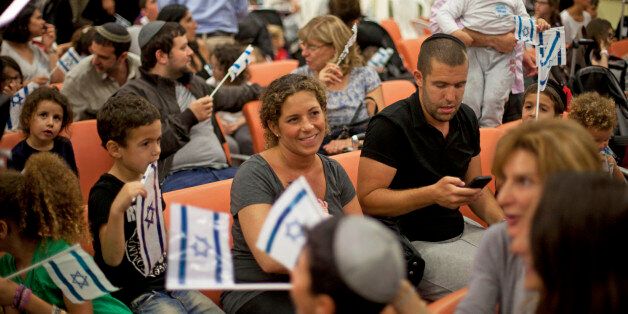JERUSALEM — Undeterred by the relentless rounds of cross-border hostilities between Israel and Hamas, hundreds of French Jewish immigrants gleefully accepted their Israeli identity cards at a ceremony here on Thursday afternoon.
“I came because of anti-Semitism,” said teary-eyed Veronique Rivka Buzaglo, one of 430 immigrants who arrived from France the day before. “You see it in the eyes of people. I see it in everything,” she continued in broken Hebrew, referring to the rising anti-Semitism in her home country.
As a proud, self-identified Zionist, Buzaglo says nothing would have stopped her from becoming an Israeli citizen this week — not even the rocket sirens frequently blaring in the south of the country, where she plans to live.
Since the conflict began on July 8, Hamas has fired more than a thousand rockets into Israel, and Israel has bombarded the Gaza Strip with land, air and sea strikes. On Thursday, Israel ramped up its military efforts and launched a major ground offensive in Gaza with thousands of troops. More than 260 Palestinians have been killed, the majority of them civilians, while there have been two Israeli fatalities, one solider and one civilian.
Yet despite the violence, more than a thousand Jews have made aliyah (when Jews immigrate to Israel) in the past 10 days, according to the Israeli government. Buzaglo is one of many Jews coming from abroad who say they view Israel as a fresh start, a chance to really belong somewhere.
“You, dear friends, are the answer to the complicated security situation we are experiencing these days,” Minister of Aliyah and Immigrant Absorption Sofa Landver said in a statement to foreign press, speaking of the recent immigrants. “Every immigrant strengthens us as a people and a state. Aliyah is our national Iron Dome.”
For Izaar Shirit, a 40-year-old construction worker from Paris, his journey to Israel is his homecoming. He plans to move with his wife and daughter to the southern city of Ashdod, where he was born. The violence between his country and Hamas doesn’t make him doubt his decision, he said.
“I was born in Ashdod and I want to return to Ashdod,” he said after the ceremony in Jerusalem. “I’m an Ashdodi and I’m not afraid. I think that it will be worked out, with the help of God.”
The Israeli government said it expects more than 5,000 Jews from France alone to immigrate here by year’s end, compared to 3,289 last year and 1,917 in 2012. But it’s not just the French who have become Israeli citizens during the conflict.
Becky Kupchan, a 27-year-old Chicago native, immigrated to Israel on the first day of the country’s offensive. With the help of an organization that promotes immigration to Israel from North America and the U.K., she says she got her citizenship in just one day at the airport, which she acknowledged was a much easier process than many others face. Many non-Jewish East African migrants seeking asylum in Israel have been detained or deported in recent years.
A frequent visitor to Israel before she decided to immigrate, Kupchan says the conflict only intensifies her desire to be an Israeli citizen.
“I’m honestly just happy to be here,” she told The WorldPost by phone as she took a bus from the southern city of Beer Sheva to Jerusalem for a job interview. “You never know what’s going to happen and it’s really powerful to see people supporting each other here.”
Like many immigrants who come to Israel, Kupchan decided to move to the south because it has a lower cost of living compared to cities like Tel Aviv and Jerusalem. Thinking of her upcoming wedding next month, she noted that it would be a much harder choice if she had children. She said she hopes the sirens will be a thing of the past when that time comes for her and her fiance.
For Buzaglo, who has three children, the nearly two weeks of rocket fire won’t deter her from living down south.
“I’m not worried. I’m in my country,” she said defiantly. “I’m not afraid. God will protect us.”
Shira Rubin contributed reporting from Jerusalem.





